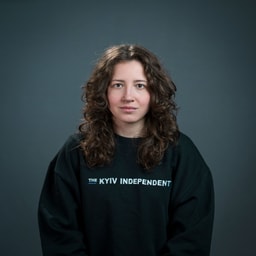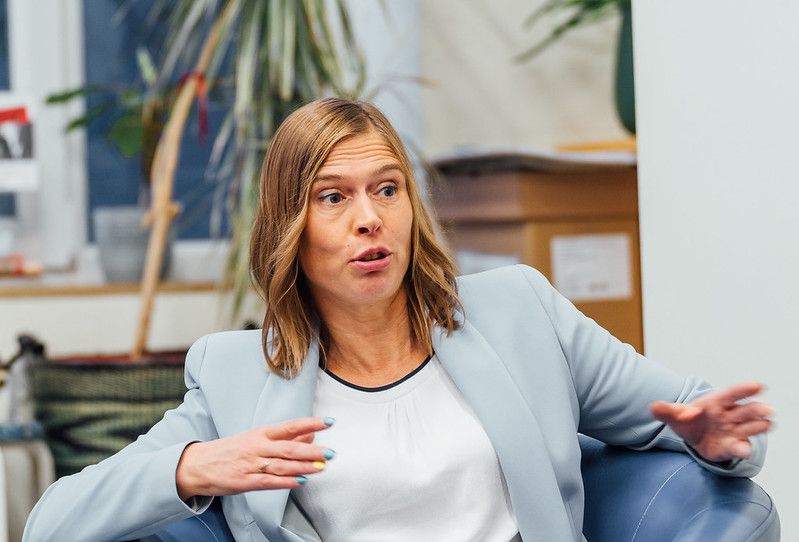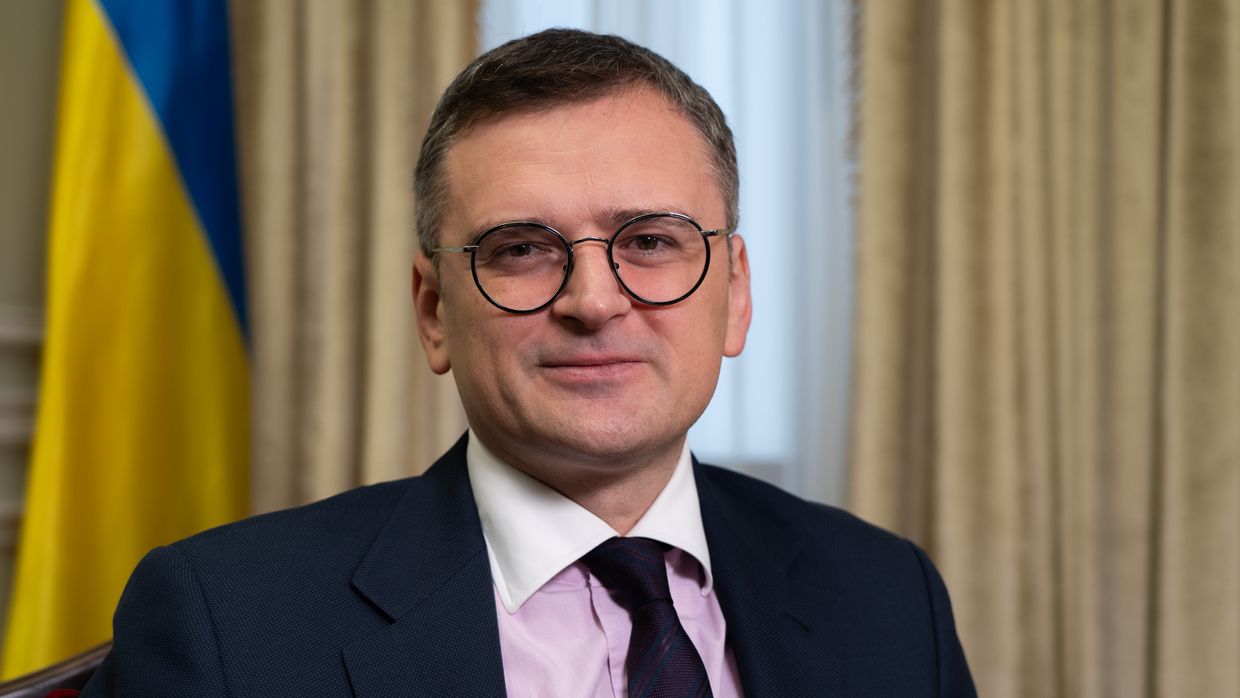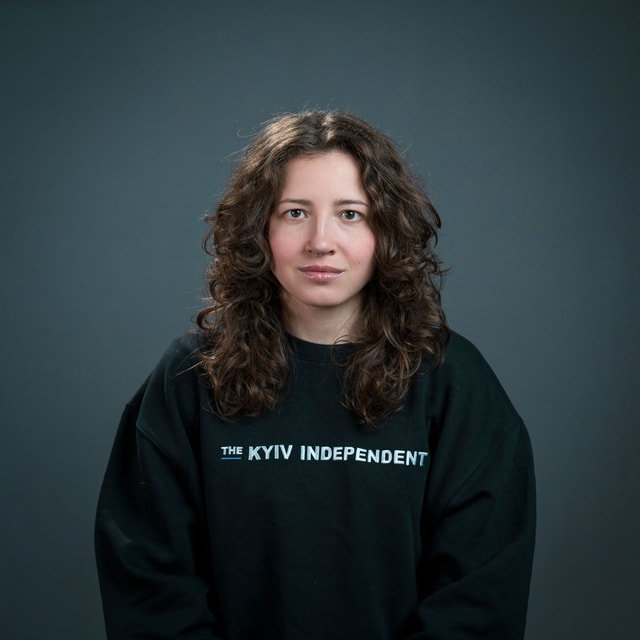Estonian PM: ‘Our taxpayers shouldn’t pay for damages caused by Russia’

Editor’s Note: This interview has been edited and condensed for clarity.
Estonia has been one of Ukraine’s most reliable allies since the onset of Russia’s full-scale invasion.
A small Baltic country of just 1.3 million people that also shares a border with Russia, Estonia has provided assistance to Ukraine worth nearly 500 million euros, or more than 1.4% of its GDP, making it one of the leading supporters by GDP share.
In a recent show of support, during President Volodymyr Zelensky’s visit to Estonia on Jan. 11, Tallinn pledged to allocate 1.2 billion euros for Kyiv in the next four years.
Throughout all this time, the Estonian government has been led by Prime Minister Kaja Kallas, a vocal supporter of Ukraine.
The Kyiv Independent spoke with Kallas via a video call on Jan. 12 to discuss Zelensky’s recent visit, the idea of mobilizing Ukrainians living in Estonia, and whether the West is ready for Donald Trump’s increasingly likely return to the White House.

The Kyiv Independent: We're talking just a day after President Zelensky’s visit to Estonia as part of his bigger Baltics tour. What was his main message to you?
Kaja Kallas: First of all, the message was to say thank you to the Estonian people, as we have been great supporters of Ukraine, not only militarily, politically, but also in terms of accepting refugees and in humanitarian aid. So we are a small country with a big heart.
The second thing was to say that there is the will to defend Ukraine, but we also need the belief in victory because the West needs to help Ukraine to win the war. We really have to believe that Ukraine is able to win. And that depends on the aid, military aid, the political support that we are giving to Ukraine.
The Kyiv Independent: Estonia has welcomed around 36,000 Ukrainian refugees. Have you and President Zelensky discussed the idea of mobilizing Ukrainians in Estonia and do you personally support that?
Kaja Kallas: Yes, we discussed the issue of Ukrainian refugees, especially the men who are of the mobilization age. President Zelensky was describing that there are people who are on the battlefield and then there are people who are paying taxes to Ukraine so that you can fund the soldiers who are on the battlefield. But then there are also people who are in foreign countries like Estonia. Now for us, they have the right to be here if they follow the rules, if they have reached us, then the EU gives them temporary protection. So we will definitely not do anything on our side to give those people out. It is up to Ukraine to turn to the people who are here and request them to come back to help their motherland.
The Kyiv Independent: Will the EU accept Hungary's demand to revise aid to Ukraine on an annual basis to be able to unblock the 50 billion euro package?
Kaja Kallas: We have to reach a conclusion and decide on Feb. 1 regarding this aid. What I can assure you is that 26 countries are firmly behind giving these 50 billion to Ukraine. Now the question is what we can do so that 27 are behind this decision. And I'm still optimistic that we will reach this. There are different options so that everybody is on board. Because I think it's not only about us sending these 50 billion to Ukraine – that we will do one way or the other – but it's also what kind of message we send to the Kremlin. We are united is one message, and that has been a very strong message. And that has been a negative surprise to Putin and the Kremlin that we have been so united. So I think that is our strength and we have to keep that.
Then we can also show our other partners across the Atlantic that we have made our decision and hopefully, they will do the same because again we have to help Ukraine for it to be able to defend itself.
The Kyiv Independent: Some believe that Ukraine now needs to focus on attacks on occupied Crimea and Russia's Black Sea Fleet to increase the pressure on Moscow. And for that, of course, Ukraine needs reinforcements of long-range capabilities, namely Taurus from Germany and ATACMS from the U.S. Should they provide these long-range missiles?
Kaja Kallas: In terms of military strategy I would leave it to the military experts to decide what works and what doesn't. What I can say from the political point of view is that we should help Ukraine with all the means and equipment that we have because this is the way that Ukraine can really push back the aggressor.
On our side, we have made a decision to help Ukraine with at least 0.25% of our GDP in the coming four years. And we have made a plea to other European countries and allies to do the same, because if you think about the combined defense budgets of the Ramstein coalition, then they are much bigger than that of Russia's heavily inflated one. And if you just make a simple calculation of how much money Russia spends on war monthly, it's roughly 5.3 billion euros. But if you take the combined budgets and this 0.25% of GDP of all those Ramstein coalition countries, then it would be 120 billion. That would definitely turn the tide in the favor of Ukraine. But then, of course, the other question is the specific military equipment, and there I say that whatever you have that could help Ukraine win you should give. I mean whoever has it, but it's up to those countries to decide eventually.

The Kyiv Independent: Many see the question of providing long-range missiles as a political one and think that there is no political will to do that from Washington and Berlin. Do you agree with that?
Kaja Kallas: Of course, it's a political decision. So I agree with that. If Ukraine doesn't have long-range weapons, then the aggressor has the upside to attack Ukraine and take more territories because they know that Ukraine can't reach them. So in order to make a difference, you have to have long-range weapons so that there is a calculation also on the Russian side that they might also hurt us, which means that maybe we will not take up this attack. If they think they can only win, then of course they don't count their own people and just continue.
The Kyiv Independent: Russia also knows that the West is against Ukraine using Western weapons against Russian territory. Do you think that also should change?
Kaja Kallas: Yesterday in Estonia, he said that he has the feeling that some of the Western countries have a fear of Russia losing. And this maybe comes from history, thinking of what comes after Russia is humiliated. But I've stressed so many times that let's not worry about Russia's face or Russia's humiliation. Let's worry about really ending this war because this is what is at stake here. And we can worry about what comes after later on, but the problem right now, the war is on Ukrainian soil. One country has attacked another country. There's clearly one aggressor and one victim. There are no gray areas in this.

The Kyiv Independent: Are there any EU officials advocating for peace talks and a ceasefire between Ukraine and Russia at the moment?
Kaja Kallas: I don't see that. I see that the political leaders of the European Union and NATO have put their political will behind supporting Ukraine. And it's very hard for them to back down from that support. Of course, we have elections and that might change in those countries, but so far I haven't seen that. I think there is a difference between 2014 and 2024.
In 2014, I was a member of the European Parliament and I saw how quickly it went from “let's support Ukraine” to “let's sit down and negotiate and give away a territory so that Russia is happy and is not moving further away.” This time we have been able to explain how giving in to the aggressor only results in more war, which has happened. So this is, I think, the understanding of the leaders around the table, that weakness provokes Russia. Strength doesn't. And peace is just a pause for Russia to get their act together to continue. Therefore, we, of course, need peace, but we need sustainable peace.
The Kyiv Independent: Do you think Ukraine can win this war by military means?
Kaja Kallas: I believe that Ukraine can win this war because the Ukrainian will to win this war is very strong. You are defending your home. But Ukraine can win this war when the West helps Ukraine with the military equipment and the military support. We really have to understand that it's also on our shoulders. Winston Churchill talked about the blood, sweat, and tears. This time it's only Ukrainian blood, sweat, and tears, but the rest of us need to have a very clear mind, strong standpoint, and also some real allocation of resources so that Ukrainians can win.
The Kyiv Independent: If Donald Trump wins the U.S. presidential election, do you think that you would be able to supply sufficient aid to Ukraine in case there's a decrease in U.S. support?
Kaja Kallas: Europe has done its share and has supported Ukraine more than the U.S. has. But of course, the U.S. has supported Ukraine a lot, and this is very important that they continue to do so. If you talk to Republicans and Democrats in the U.S. Congress – I have had meetings with many of them – there is strong support for helping Ukraine. But of course, they have elections coming, and presidential candidate Donald Trump has been quite vocal about what he thinks about the Ukrainian war. So definitely elections are a turbulent time, but I believe, and I'm an optimist, that there is a strong political will across the aisle in the parties, both Democrats and Republicans, to continue to support Ukraine.
I was just in the U.S. and one of the things that I said to them is that the U.S. considers itself as the best country in the world, the number one country in the world. If the U.S. has supported Ukraine and now backs from it, then it means that Russia wins, and then it means that the U.S. becomes the second country in the world, and I don't think it's in their interest.
The Kyiv Independent: If Donald Trump becomes U.S. President, does Estonia feel safe as a NATO member in case there is aggression against it by Russia?
Kaja Kallas: The West sometimes buys into the narratives that Russia is trying to develop. And one of those narratives is that the West is weak, NATO is weak, but actually we shouldn't underestimate our own power. Russia is definitely afraid of having a conflict with NATO. And as we are in NATO, we don't have the war here. So I don't think that this is a real threat, but as I said, it is clear that European countries have to boost their own defense expenditure. There is Article 5 in NATO that we all know, but there's also Article 3, which means that every country has to do its utmost to increase its own defense. And collective defense.
NATO is not only the U.S., but it's also Great Britain and France, two nuclear countries, it's also Germany. We have the new NATO plans ready. We have the pre-positioned equipment. We also have to show the Kremlin that we are ready. We are ready to defend ourselves and he will not have success here and that would hopefully make them calculate otherwise.

The Kyiv Independent: So you don't think that Russia could dare to attack Estonia or any other NATO territory?
Kaja Kallas: Well, right now they are not taking up a conflict with NATO, but it's very important how we are reacting in the Ukraine war and if this aggression pays off. When they annexed Crimea, it was the “little green men.” They were embarrassed that it's Russian soldiers. They tried to hide it, they were afraid of the Western reaction. Because the Western reaction was weak at the time, they made a mental note that they can do this because nothing happens. So if they can attack Ukraine, get away with no punishment, no accountability, then the next step could be NATO. That's why it's very important that we stay united behind Ukraine, we help Ukraine militarily so that it is able to win this war and push Russia back to its borders.
The Kyiv Independent: You recently wrote in an opinion piece that Moscow believes it can outlast Ukraine and the West. Do you believe that the West and Ukraine can outlast Moscow?
Kaja Kallas: Yes, I believe so, because of several elements. One is that the combined defense budgets of the Ramstein coalition that are supporting Ukraine are 13 times bigger than that of Russia's heavily inflated one. If you take the economic power of even only European countries, it’s seven times bigger than that of Russia.
There's a lot of talk about war fatigue in the West, but there is not much talk about the war fatigue in Russia. Of course, it's not a democracy, it's not a free country, so we don't see it in the way that we see it in our free media, but what we know from our intelligence is that there's war fatigue in Russia because their young people are coming back in coffins. There's also a big problem with financing the war machine because the budget is in a big deficit and they can't loan money from outside because of the sanctions. And China is not lending them any money. So they are in a place where they have to probably raise taxes in order to finance that war machine.
If you think about the Prigozhin mutiny, of course, Prigozhin was eliminated, but what he said was that the army was not happy with the equipment, training, and plans. So has that all changed? I don't think so, although we don't hear about this.

The Kyiv Independent: Yet Russia's economy has proven more resilient than many expected and the initial idea to suffocate its war machine and isolate Moscow completely has had limited success. Does the West need to change its strategy?
Kaja Kallas: Well, again, I wouldn't buy into that narrative that it's not working. We know that the sanctions are hurting Russia. Of course, the issue is the circumvention of sanctions that we have to work on. We have to deal with that, and we will deal with that.
One thing that really worries me is the political isolation. If we see Russia coming back to the tables around different political organizations – that is something that we have to completely isolate them from as long as they are waging a war against their neighbor. But it hasn't been so strong.
We should also think outside of the box. Some things that are not the big sanctions, but smaller things, also affect Russia. One example was when we decided that we would not let the Russians enter our border. That had a huge effect because the people of Moscow and Saint Petersburg couldn't travel to Europe anymore. The other example is the use of frozen assets. The assets have been frozen but Russians, the oligarchs are thinking that they will get them back eventually. If we start to actually use them for the benefit of Ukraine, then oligarchs will realize they are losing them because of this war. I think that this will have an effect because we see that the discussions around this already have an effect.

The Kyiv Independent: Regarding frozen Russian assets, a committee in the Estonian Parliament has just initiated in November this process of actually transferring these assets as aid to Ukraine. Do you think it will be widely supported by the parliament and the president?
Kaja Kallas: There are estimates that the frozen assets cover 80% of the recovery of Ukraine. So there is a lot of interest from other countries regarding our laws and we have been distributing this as well. We hope that it goes smoothly in the parliament and also the president supports the law.
The argument against this is that we are violating property rights, but property rights are not absolute. And property rights have already been violated by freezing the assets. So Russia may have a claim towards us, but also there's a legitimate claim of Ukraine towards Russia. So I think we have tried to make the law as bulletproof as possible. Can I as a lawyer say that it is totally bulletproof? I can't, but it's better than nothing. And I think it is getting to politicians in other countries that our taxpayers shouldn't pay for the damages caused by Russia.
The Kyiv Independent: How do we keep up support for Ukraine for years to come?
Kaja Kallas: The countries that support Ukraine are all democracies, which means that, ofcourse, we have domestic problems and issues coming up, and we really have to concentrate our focus on ending this war. In democracies, we argue, we debate, but we have to do it. I've encouraged other allies, like Estonia did, to commit 0.25% of their GDP in the next four years to support Ukraine militarily. So if everybody else does that in the Ramstein coalition, that would mean that there would be 120 billion euros for Ukraine, and that would definitely outlast Russia. That would actually be an important tipping point for this war to end.
Note from the author:
Hi there. This is Toma Istomina, deputy chief editor at the Kyiv Independent. Thank you for reading this interview. You don't see my byline often because I mostly edit other journalists' stories you read on our website, but I have been working tirelessly since day one of the Kyiv Independent and even more tirelessly since the beginning of Russia's full-scale invasion of Ukraine. It has been incredibly difficult to live in a country at war and see all the atrocities Russian forces brought here. This war is a matter of existence for Ukrainians, which is why we continue to fight. But it means the world to have international support and not feel alone in this fight. Please consider supporting the Kyiv Independent by becoming our memeber.
















